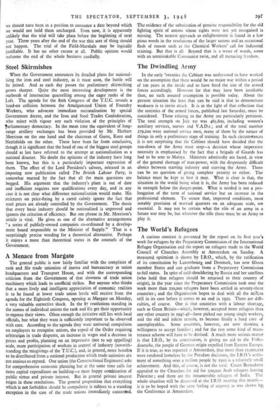A Menace from Margate
The general public is now fairly familiar with the complaint of rank and file trade unionists of inertia and bureaucracy at union headquarters and Transport House, and with the corresponding criticism from the Government of that slowness of trade union machinery which leads to unofficial sirikes. But anyone who thinks that a more lively and intelligent appreciation of economic realities is to be found at lower trade union levels will receive from the agenda for the Eightieth Congress, opening at Margate on Monday, a very valuable corrective shock. In the 87 resolutions standing in the names of individual unions the rank and file get their opportunity to express their views. Often enough the initiative still lies with local officials, but what they want is sufficiently important to be observed with care. According to the agendathey want universal compulsion on employers to recognise unions, the repeal of the Order requiring arbitratigin in trade disputes, an increase in wages and a decrease in prices and profits, planning on an impressive (not to say appalling) scale, more participation of workers in control of industry (notwith- standing the misgivings of the T.U.C.), and, in general, more benefits to be distributed from a national production which trade unionists are not anxious to expand. One union (the Constructional Engineers) asks for comprehensive economic planning but at the same time calls for more capital expenditure on building—a most happy combination of public virtue and private interest. But in general private interest reigns in these resolutions. The general proposition that everything which is not forbidden should be compulsory is subject to a standing exception in the case of the trade unions immediately conceriltd. The evidence of the substitution of genuine responsibility for the old fighting spirit of unions whose rights were not yet recognised is missing. The nearest approach to enlightenment is found in a few pious words in the resolutions of the larger unions and an occasional flash of reason such as the Chemical Workers' call for industrial training. But that is all. Beyond that is a waste of words, some with an unmistakable Communist twist, and all menacing freedom.


































 Previous page
Previous page